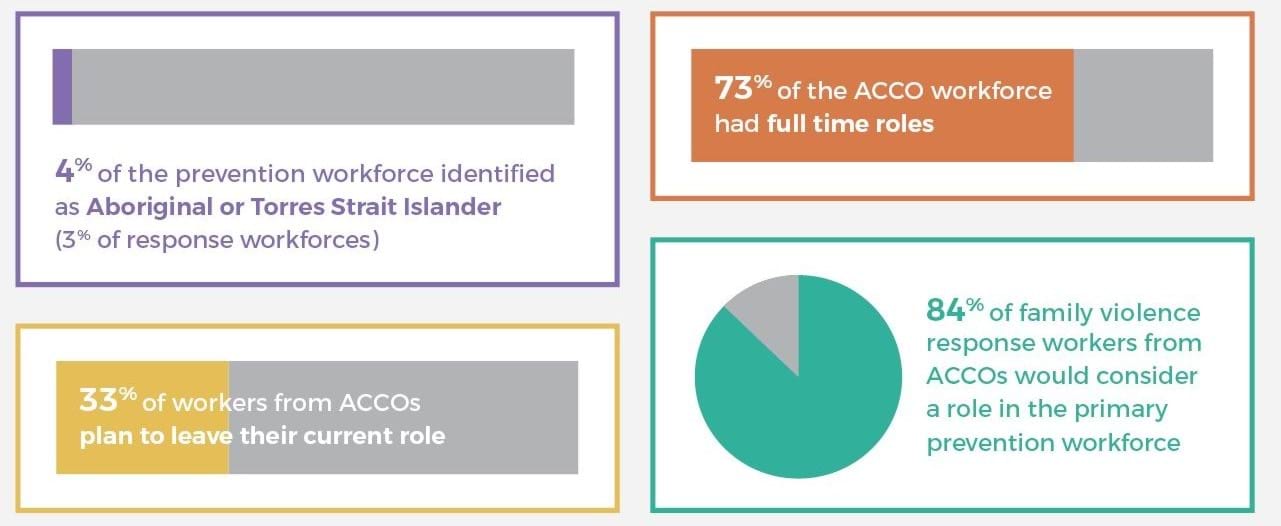As noted in our related report on Victoria’s primary prevention system architecture, having a skilled and stable workforce is essential to family violence prevention (and early intervention) efforts.
Who makes up the Aboriginal prevention workforce?
Family Safety Victoria’s current Preventing Family Violence and Violence Against Women Capability Framework describes the prevention workforce as consisting of two parts:
- prevention practitioners – those who ‘specialise in designing, implementing and monitoring actions to prevent violence against women’
- prevention contributors – those who are located within specific sectors or disciplines where preventing violence against women may be a part of their role but it is not their primary focus. These practitioners include teachers, health sector staff, sports administrators, local government staff and child and family services staff.
However, many stakeholders interviewed for our report on primary prevention system architecture found it difficult to define precisely who the primary prevention workforce is, with one commenting that this could change from year to year, depending on where grants are allocated and shifting organisational priorities. The picture is even less clear for the Aboriginal prevention workforce because there is a tension between the integrated approach to prevention and response within ACCOs, and prevention as a specialised discipline within the mainstream system. ACCOs consulted for this report did not identify as having specialist prevention workers in the mainstream sense. They emphasised the criticality of cultural knowledge in developing and delivering prevention and early intervention initiatives for Aboriginal communities in Victoria.
Looking at the family violence sector overall, the 2020 family violence workforce census found that 4 per cent of the prevention workforce identified as Aboriginal and/or Torres Strait Islander (see Figure 16) (and 3 per cent of the response workforce); however, the prevention workforce report did not differentiate between those who worked in ACCOs versus mainstream organisations.
Figure 16: Aboriginal family violence workforce

Source: Orima Research (2020): 2019-20 Census of Workforces that Intersect with Family Violence, Survey Findings Report – Specialist Family Violence Response Workforce (unpublished) and Orima Research (2020): 2019-20 Census of Workforces that Intersect with Family Violence, Survey Findings Report – Primary Prevention Workforce (unpublished)
Workforce satisfaction and challenges
Based on the 2020 workforce census, staff morale within ACCOs appeared to be higher than in the overall workforce:
- 83 per cent of ACCO staff reported being satisfied with their roles and working conditions (compared with 75 per cent for the overall workforce).
- While workplace stress was high, more than two-thirds (68 per cent) of surveyed ACCO staff reported experiencing at least a moderate level of stress in their jobs; this was lower than the overall workforce average (78 per cent).
- 33 per cent of ACCO staff reported having plans to leave their current role, compared with 40 per cent for the overall workforce. The main reasons were end of contract (with short-term contracts a reflection of short-term funding cycles), in addition to lack of career advancement opportunities and stress.
- 84 per cent of ACCO staff surveyed for the specialist family violence response survey said that they would consider taking a role in the primary prevention workforce in future, compared with 81 per cent overall.
However, when it came to capacity building, slightly fewer ACCO workers reported having confidence in their own level of training and experience – 58 per cent of ACCO workers compared with 61 per cent for sector workers overall.
ACCOs consulted for this report repeatedly raised two particular workforce challenges:
- recruiting and retaining skilled staff
- the need for more psychosocial support for staff who may themselves have experienced family violence, or who may face lateral violence.
Given the widespread staff shortages being experienced in the family violence sector in Aboriginal communities, ACCOs’ ability to attract and retain key staff must be central to any capacity-building efforts. Stakeholders consulted were particularly concerned by the implications of Royal Commission recommendation 209 (mandatory qualifications) for ACCOs in growing and retaining culturally skilled Aboriginal staff. While this recommendation relates to the response workforce, the integration between prevention, early intervention and response in ACCOs and the centrality of culture in Aboriginal prevention efforts it is a barrier to workforce development. Our forthcoming report on the crisis response to recovery model for victim survivors further considers the impacts of this recommendation, including for Aboriginal organisations. Stakeholders also raised the difficulty of competing for staff with mainstream organisations that can offer higher salaries and longer contracts.
Capacity-building needs
Supporting Aboriginal-led prevention efforts is one of the five critical actions in the Dhelk Dja 3 Year Action Plan. We note that a range of work is currently underway to support the Aboriginal workforce in the family violence sector, including a scholarships program to support the qualification requirement of Royal Commission recommendation 209, an extended pathway to support people with cultural expertise in meeting the qualification requirement, and a graduate certificate that incorporates Aboriginal cultural safety. A (mainstream) primary prevention accredited qualification is also being developed for prevention contributors to access through the TAFE sector; however, we note that the level of demand for this course within the ACCO sector is so far unclear.
The integrated approach to prevention within the Aboriginal community raises a question of how to best build prevention capability when a specialised prevention workforce cannot be easily identified. Given the dispersed nature of the Aboriginal-led prevention workforce and the still-emerging understanding of its definition and best practices, it is challenging to identify relevant and accessible training opportunities. While ACCO staff with significant experience in working to prevent family violence in their communities clearly have culturally relevant expertise, it would be worth exploring how this knowledge can be transferred and shared across the sector more broadly. The Victorian Aboriginal prevention contributors in the family violence prevention space might like to consider the approaches in the mainstream family violence sector in relation to the prevention and intervention systems that are in place. This of course would need to be adapted to meet Aboriginal self-determination principles and practices. Equally, they need mentorship from experienced practitioners in integrated approaches to inter-generational, family and community healing. These capacity-building options also need to be accessible to those living in regional communities, some of whom may be unable to leave their community to study. As well as training, staff need access to ongoing, culturally relevant resources and guidance on best practices. As outlined earlier, a model like the Balit Durn Durn Centre could be an effective approach to translate specialist prevention expertise from the mainstream prevention sector and to provide support and build prevention and early intervention capability in the ACCO sector workforce [relates to action 4].
Cultural competency in mainstream organisations
It is also important to build the mainstream workforce’s diversity and capacity to engage in a culturally sensitive way with Aboriginal clients who are experiencing or are witness to family violence. Respect Victoria’s 2018–2021 progress report to the state parliament found that practitioners interviewed felt they had gained a good theoretical understanding of the concept of intersectionality and diverse groups (including Aboriginal people) but did not know how to apply an intersectional approach in practice.
Numerous stakeholders raised that this is yet to occur in a concerted sustained manner, explaining that there needs to be greater mainstream obligation to work appropriately with the Aboriginal community and that running a single cultural awareness training session isn’t enough – there needs to be ongoing development and commitment to culturally safe workplaces and services. Many organisations also explained that they are frequently asked to consult or undertake cultural capacity-building work by mainstream organisations but that their time and expertise is rarely paid for. We believe that mainstream organisations need to commit to further concrete actions to progress cultural capability building within their organisation as part of the next Dhelk Dja action plan [relates to action 6].
Updated

